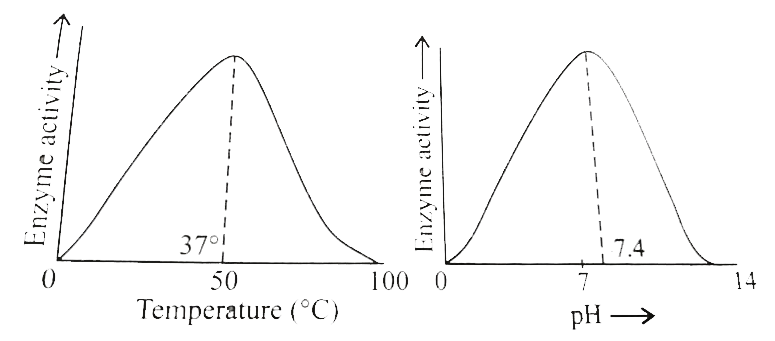How does the rate of an enzyme-catalyzed reactions vary with (a) temperature and (b) pH? Represent diagrammatically.
Video Solution
Text Solution
As the temperature or pH is increased, the rate rise till it is maximum at 37∘C (physiological temperature) or pH=7.4 and then falls off (as shows in the figure).


|
Topper's Solved these Questions
- SURFACE CHEMISTRYBOOK - CENGAGE CHEMISTRYCHAPTER - SURFACE CHEMISTRYEXERCISE - Solved Examples
20 Videos
- SURFACE CHEMISTRYBOOK - CENGAGE CHEMISTRYCHAPTER - SURFACE CHEMISTRYEXERCISE - Ex 5.1
11 Videos
- SOLUTIONSBOOK - CENGAGE CHEMISTRYCHAPTER - SOLUTIONSEXERCISE - Ex 2.3 (Objective)
9 Videos
- SYNTHETIC AND NATURAL POLYMERSBOOK - CENGAGE CHEMISTRYCHAPTER - SYNTHETIC AND NATURAL POLYMERSEXERCISE - Exercises Assertion Reasoning
10 Videos
Similar Questions
Knowledge Check
First step of an enzyme - catalyzed reaction is
AEnzyme breaks the chemical bond of substrateBEnzyme releases the products of the reactionCThe substrate binds to the active site of the enzyme , fitting into the active siteDActive site reacts with substrate forming enzyme product complexHow does an enzyme catalyze a reaction ?
ABy increasing activation energy of the reactionBBy decreasing activation energy of the reactionCBy supplying heat energyDFirst increases and then decreases activation energyAt what PH range the rate of enzyme catalyzed reaction is maximum ?
A5 to 7B6 to 8C7 to 9D8 to 9
How does pH affects the rate of enzyme activity?
View SolutionHow does chemisorption vary with temperature.
View SolutionHow does the electrical conductivity of super- conductors vary with temperature ?
View SolutionHow is the rate of enzyme-catalysed reactions affected by every 10∘C rise in temperature?
View SolutionIn a chemical reaction, enzymes catalyze the reaction by
View Solution
